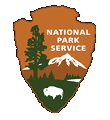|
Mary McLeod Bethune Council House National Historic Site District of Columbia |
 |
 NPS photo | |
I leave you love. I leave you hope. I leave you the challenge of developing confidence in one another. I leave you a thirst for education. I leave you respect for the uses of power. I leave you faith. I leave you racial dignity. I leave you a desire to live harmoniously with your fellow man. I leave you finally a responsibility to our young people.
—Mary McLeod Bethune's "Legacy," 1955
By her own words and example, Mary McLeod Bethune demonstrated the value of education, a philosophy of universal love, and the wise and consistent use of political power in striving for racial and gender equality. The 15th of 17 children of former slaves, Bethune grew up amidst the poverty and oppression of the Reconstruction South, yet rose to prominence as an educator, presidential advisor, and political activist.
Through her own schooling by missionaries in South Carolina, Bethune recognized the importance of education in the emerging struggle for civil rights. In 1904 she founded the Daytona Educational and Industrial School for Negro Girls in Daytona Beach, Florida, which later merged with the Cookman Institute to become Bethune-Cookman College—and later, Bethune-Cookman University.
Mary McLeod Bethune worked tirelessly to influence legislation affecting African Americans and women and continued to be an important voice for human rights until her death in 1955 at the age of 79.
Headquarters for the National Council of Negro Women
In 1935—the same year President Roosevelt brought her to Washington as a special advisor on Negro affairs—Bethune founded and became the first president of the National Council of Negro Women.
Always eloquent, Bethune wrote:
"The great need for uniting the effort of our women kept weighing upon my mind. I could not free myself from the sense of loss, of wasted strength sustained by the national community through failure to harness the great power of women into a force for constructive action. I could not rest until our women had met this challenge."
Today, through national affiliate organizations and 250 community-based sections, the National Council of Negro Women unites millions of Women, in their efforts to reach peaceful solutions to the problems of human welfare and civil rights.
National Archives for Black Women's History
Mary McLeod Bethune was one of the first African American leaders to recognize the need to preserve historical records, especially those pertaining to African American women.
Appropriately, the house that once served as headquarters for the National Council of Negro Women contains the National Archives for Black Women's History, the only institution in the United States solely dedicated to this purpose. The archival holdings include the personal papers of African American women, records of their organizations, and a collection of more than 4000 photographs that document African American women's activities in the 20th century.
Designated a National Historic Site by Congress in 1982, the Mary McLeod Bethune Council House is now administered by the National Park Service.
The Mary McLeod Bethune Council House National Historic Site continues to serve as a research center. It's archive preserves the heritage of African American women, and the site recognizes the achievements of African American women, and serves as a memorial to a pioneer in her field. It perpetuates Bethune's legacy of leadership, commitment, and service.
Related Points of Interest
Logan Circle Historic District
The Bethune Council House is part of a neighborhood of distinguished three and
four-story Victorian houses built in 1875. At first, a fashionable residential
area for whites, by the 1940's these were the homes of prominent African
American political and social figures. With time, those residents moved on and
the once-grand homes deteriorated. In recent years, preservation efforts have
revitalized the area.
Lincoln Park
A 12-foot-tall bronze statue of Mary McLeod Bethune graces Lincoln Park, located
on East Capitol Street between 11th and 13th Streets Northeast. Dedicated in
1974 on the 99th anniversary of Bethune's birth, the statue is inscribed with
the educator's famous "Legacy".
 (click for larger map) |
African American Heritage Trail
The Mary McLeod Bethune Council House NHS is among the sites included in the
African American Heritage Trail of Washington, DC. For free copies of the trail
booklet, contact the Mary McLeod Bethune Council House.
How To Get There
The Mary McLeod Bethune Council House is located at 1318 Vermont Avenue, NW
METRO:
The closest stations are:
• McPherson Square Station on the Orange and Blue lines
• U Street/Cardozo on the Green line.
Features
• Ranger-led tours
• Exhibits, films, lectures, workshops
• Bookshop
• Archives, open by appointment
Source: NPS Brochure (undated)
Documents
Foundation Document Overview, Mary McLeod Bethune Council National Historic Site, District of Columbia (December 2016)
Historic Resource Study: Mary McLeod Bethune and the National Council of Negro Women — Pursuing a True and Unfettered Democracy (Elaine M. Smith, September 2003)
Historic Structure Report, Mary McLeod Bethune Council House National Historic Site (Beyer Blinder Belle Architects & Planners LLP, April 29, 2008)
Junior Ranger Activity Book (Ages 7-12), Mary McLeod Bethune Council House National Historic Site (Date Unknown; for reference purposes only)
mamc/index.htm
Last Updated: 01-Jan-2025
